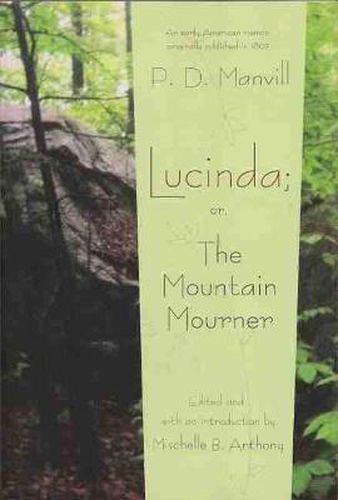Readings Newsletter
Become a Readings Member to make your shopping experience even easier.
Sign in or sign up for free!
You’re not far away from qualifying for FREE standard shipping within Australia
You’ve qualified for FREE standard shipping within Australia
The cart is loading…






In 1807, a small rural New York press published the first edition of P. D. Manvill’s
Lucinda ; or,
The Mountain Mourner . Over the next five decades no fewer than ten printings of the novel appeared in three different states. In the book, the eponymous heroine is one of seven children left to the ailing and poverty-stricken widower Adrian Manvill. Although it is a memoir,
Lucinda
reads like a sentimental epistolary novel, where the heroine is seduced, abandoned, and then dies in isolation shortly after her illegitimate child is born. Mischelle B. Anthony’s critical edition rescues this once-popular cautionary tale from obscurity and positions it among such classic early American narratives as
Charlotte Temple
and
The Coquette . In addition to providing insight into the Republican and nineteenth-century reading culture,
Lucinda , as a historical document, provides a glimpse into one family and one community dealing with radical social and economic issues in early America. In her introduction, Anthony sheds light on the text’s multiple functions among its nineteenth-century readership and draws attention to its unique status as a narrative written by a participant in the events.
$9.00 standard shipping within Australia
FREE standard shipping within Australia for orders over $100.00
Express & International shipping calculated at checkout
In 1807, a small rural New York press published the first edition of P. D. Manvill’s
Lucinda ; or,
The Mountain Mourner . Over the next five decades no fewer than ten printings of the novel appeared in three different states. In the book, the eponymous heroine is one of seven children left to the ailing and poverty-stricken widower Adrian Manvill. Although it is a memoir,
Lucinda
reads like a sentimental epistolary novel, where the heroine is seduced, abandoned, and then dies in isolation shortly after her illegitimate child is born. Mischelle B. Anthony’s critical edition rescues this once-popular cautionary tale from obscurity and positions it among such classic early American narratives as
Charlotte Temple
and
The Coquette . In addition to providing insight into the Republican and nineteenth-century reading culture,
Lucinda , as a historical document, provides a glimpse into one family and one community dealing with radical social and economic issues in early America. In her introduction, Anthony sheds light on the text’s multiple functions among its nineteenth-century readership and draws attention to its unique status as a narrative written by a participant in the events.